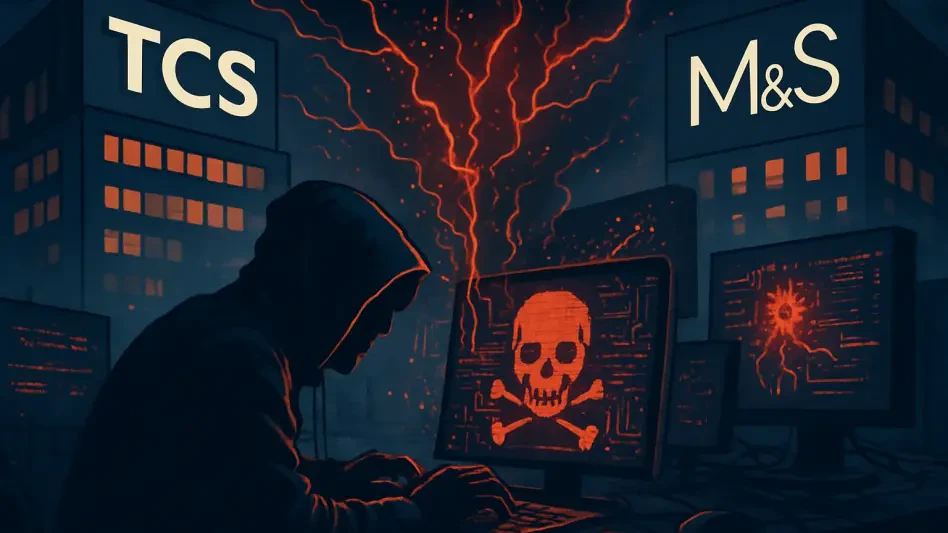In an era where cyber-attacks can cripple corporate reputations overnight, a recent incident involving Marks & Spencer (M&S), a prominent UK retailer, has ignited intense debate within the IT outsourcing industry. Reports surfaced alleging that Tata Consultancy Services (TCS), a leading Indian IT firm, lost a critical service desk contract with M&S due to a cyber breach earlier this year. This controversy raises pressing questions about accountability, transparency, and the impact of media narratives on business relationships. This roundup dives into diverse opinions and insights from industry sources, analysts, and corporate statements to unpack the truth behind the claims, offering a balanced view on what this saga means for cybersecurity and outsourcing partnerships.
Digging into the Timeline: Contract Decisions vs. Cyber Incident
Industry Views on Pre-Breach Contract Shifts
A significant point of discussion among industry watchers centers on the timeline of M&S’s decision to switch service desk providers. Many sources note that the request for proposal (RFP) process, which led to the selection of alternative suppliers, was initiated in early 2025, well before the cyber-attack occurred. This suggests that the decision was rooted in strategic business needs rather than a reaction to any security lapse. Such early planning aligns with common practices in large-scale retail operations seeking to optimize vendor alignments.
Analysts from the IT sector emphasize that RFP processes often span months, involving rigorous evaluations unrelated to sudden incidents. This perspective challenges the initial narrative that tied the contract loss directly to the breach. Instead, it paints a picture of a deliberate, preemptive shift in M&S’s outsourcing strategy, prompting discussions on how such decisions are frequently misinterpreted by external observers.
Corporate Clarifications on Timing
TCS itself has been vocal in regulatory filings, asserting that media reports linking the contract loss to the cyber incident are factually inaccurate. The company has stressed that the outcome of the RFP was finalized prior to the security event, underlining a clear separation between the two. This stance aims to correct public perception and prevent unwarranted damage to its standing in the global IT market.
Other industry voices echo the importance of such clarifications, noting that premature assumptions can erode trust in vendor-client relationships. The consensus among many corporate strategists is that transparency in communicating timelines is vital to countering speculative stories. This aspect of the controversy highlights a broader need for companies to maintain detailed public records of decision-making processes.
Responsibility in the Cyber-Attack: Who Bears the Blame?
Insights on TCS’s Role and Accountability
Turning to the cyber-attack itself, various industry analyses have focused on TCS’s role—or lack thereof—in the breach. Investigations conducted by TCS, concluded mid-year, found no evidence that the security issue originated from its systems or networks. This finding has been widely discussed among cybersecurity experts who argue that attributing blame without concrete proof can unjustly harm a company’s reputation.
Further commentary from tech consultants suggests that TCS’s clarification about not providing cybersecurity services to M&S is crucial in understanding accountability. Many agree that delineating responsibilities in outsourcing contracts is often complex, and clients may rely on multiple vendors for different security aspects. This complexity can lead to confusion in the aftermath of an incident, fueling misguided accusations.
Broader Implications for Outsourcing Trust
Some industry observers caution that even when a provider like TCS is exonerated, the shadow of doubt can linger in the public eye. They point to the risk of diminished confidence in IT outsourcing partnerships when breaches occur, regardless of fault. This concern underscores a recurring theme in discussions: the need for robust communication between vendors and clients during crises.
A contrasting viewpoint comes from risk management specialists who argue that such incidents can serve as learning opportunities. They advocate for stronger contractual clarity on cybersecurity roles to prevent similar misunderstandings. This perspective shifts the focus toward proactive measures, suggesting that the industry as a whole could benefit from revisiting standard practices in light of this case.
Media Narratives and Corporate Image: A Clash of Stories
Dissecting Media Claims and Rebuttals
The media’s role in shaping perceptions of this controversy has drawn sharp scrutiny from various quarters. Initial reports suggested a direct link between the cyber-attack and the loss of the M&S contract, a narrative that TCS swiftly countered through official channels. Media analysts highlight how sensationalized stories can amplify misinformation, especially in high-stakes corporate scenarios involving security breaches.
On the flip side, some communication experts defend the press, arguing that it often operates with limited information and tight deadlines. They suggest that while inaccuracies occur, the onus falls on companies to provide timely, accessible data to prevent misreporting. This duality in opinions reveals a tension between journalistic intent and corporate responsibility in managing public narratives.
Impact on Stakeholder Confidence
Beyond the media, corporate governance specialists weigh in on how such disputes affect stakeholder trust. They note that even refuted claims can leave lasting impressions among investors and clients, potentially influencing future business decisions. The emphasis here is on the importance of consistent messaging to mitigate long-term reputational risks.
A differing angle comes from branding consultants who see potential for companies to turn such challenges into strengths. They argue that proactive rebuttals and transparent updates can reinforce a firm’s credibility, provided the response is swift and factual. This viewpoint encourages a strategic approach to crisis communication, viewing public disputes as opportunities for demonstrating resilience.
Strategic Lessons from the Outsourcing Landscape
Trends and Shifts in Vendor Selection
Industry trend reports offer insights into the evolving dynamics of IT outsourcing, with many pointing to the increasing adoption of multi-vendor models. This approach, often seen in decisions like M&S’s move to new providers, reflects a strategic intent to diversify risk and enhance service flexibility. Such trends suggest that losing a single contract does not necessarily indicate a broader relational failure.
Some outsourcing advisors add that clients today prioritize innovation and scalability over long-term exclusivity with one provider. This shift can lead to frequent vendor changes through processes like RFPs, a reality that companies like TCS must navigate. The discussion here centers on adapting to client expectations while maintaining strong performance across multiple engagements.
Sustaining Partnerships Amid Challenges
Despite the service desk transition, several sources confirm that TCS continues to collaborate with M&S in other capacities. Business relationship experts stress that sustained partnerships in diverse areas can offset the impact of a single contract loss. This resilience is seen as a testament to the depth of long-standing corporate ties in the outsourcing sector.
A complementary opinion from partnership consultants highlights the value of diversified service portfolios. They suggest that providers with multiple touchpoints in a client’s operations are better positioned to weather isolated setbacks. This takeaway encourages IT firms to broaden their offerings as a buffer against competitive shifts.
Reflecting on Key Takeaways and Next Steps
Looking back, the discourse surrounding TCS and M&S revealed critical insights into the intersection of cybersecurity, media influence, and outsourcing dynamics. Diverse perspectives underscored that the contract decision preceded the cyber incident, TCS bore no responsibility for the breach, and ongoing collaborations with M&S remained intact. These discussions clarified misconceptions and shed light on the complexities of corporate accountability.
Moving forward, companies in similar positions could adopt actionable strategies such as establishing rapid-response communication teams to address inaccurate reports. Investing in clearer contractual definitions of cybersecurity roles might prevent future misunderstandings. Additionally, fostering industry-wide dialogues on best practices for vendor transitions and crisis management could pave the way for more resilient partnerships in the IT outsourcing realm.








